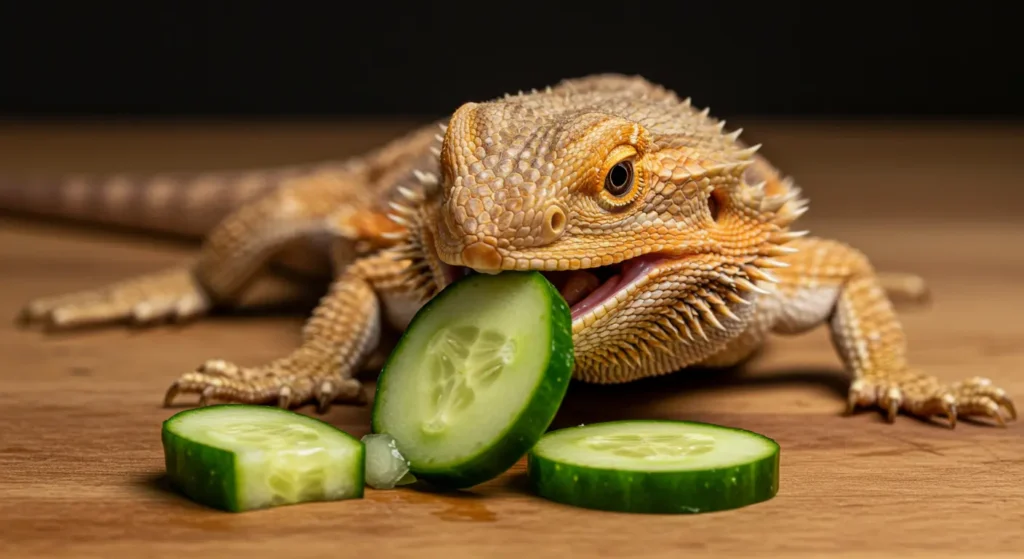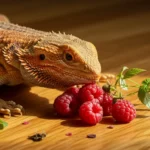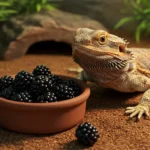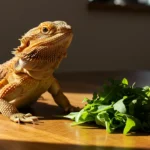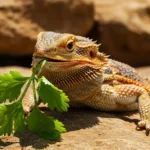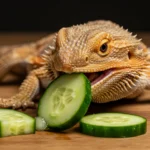Bearded dragons are fascinating pets that require a carefully balanced diet to stay healthy and active. As a responsible pet owner, you might often wonder, can bearded dragons have cucumbers? This common question arises because cucumbers are crisp, refreshing, and packed with water, making them an appealing treat for both humans and reptiles alike.
While cucumbers can be a healthy addition to your beardie’s diet, it’s important to understand how they fit into their overall nutrition. In this guide, we will explore whether can bearded dragons have cucumbers, how to prepare them safely, the potential benefits, and precautions to ensure your pet stays happy and healthy.
By the end of this article, you’ll have a clear understanding of can bearded dragons have cucumbers as a safe, occasional snack, along with tips on serving sizes, complementary vegetables, and alternative treats that provide hydration and essential nutrients.
Can Bearded Dragons Have Cucumbers? Essential Facts for Pet Owners
Cucumbers are a popular vegetable that many reptile owners consider for their bearded dragons. While they are safe in moderation, it is important to understand how cucumbers affect your pet’s health. This section covers why bearded dragons enjoy cucumbers, their nutritional value, and how they fit into a balanced diet.
Why bearded dragons enjoy cucumbers and other safe vegetables
Bearded dragons are naturally curious eaters and enjoy a variety of textures and flavors. Cucumbers appeal to them because of their crisp texture and high water content. Unlike some vegetables with strong flavors or dense textures, cucumbers are mild and easy to chew, making them a favorite for many beardies. Additionally, their refreshing quality provides a cooling sensation, which can be particularly appealing in warmer environments. Beyond cucumbers, safe vegetables such as zucchini, bell peppers, and leafy greens offer similar textures and flavors that encourage natural foraging behavior. Introducing a variety of these vegetables helps keep your dragon mentally stimulated and interested in mealtime. Offering a mix of safe veggies also ensures your pet receives a broader range of nutrients, making mealtime both enjoyable and beneficial for overall health.
Nutritional value of cucumbers: vitamins, minerals, and hydration
Cucumbers are primarily composed of water, which makes up about 95% of their weight, providing an excellent hydration source for your bearded dragon. In addition to water, cucumbers contain small but valuable amounts of vitamins and minerals. They provide vitamin C, which supports the immune system, and vitamin K, which is essential for bone health and blood clotting. Cucumbers also contain potassium, magnesium, and phosphorus, which contribute to muscle function, nerve health, and bone development. While cucumbers are not a high-calcium vegetable, their nutrient profile makes them a beneficial occasional snack. The fiber in cucumbers can aid digestion and help maintain regular bowel movements, preventing constipation. When served correctly—peeled, seeded, and cut into small, bite-sized pieces—cucumbers can be a safe, nutritious addition to your beardie’s diet, complementing other calcium-rich greens and vegetables.
How cucumbers fit into a balanced bearded dragon diet
While cucumbers offer hydration and light nutrients, they should not be the staple of a bearded dragon’s diet. A balanced diet consists primarily of leafy greens, vegetables, and a portion of insects for protein. Cucumbers can be included as an occasional snack or side dish, ideally once a week. Integrating cucumbers with other nutrient-dense vegetables ensures your dragon benefits from variety without overloading on water content or low-calcium foods. Young dragons require more protein from insects, while adult dragons benefit from a higher proportion of vegetables. Rotating safe vegetables, including cucumbers, zucchini, bell peppers, and collard greens, promotes a healthy appetite and prevents dietary monotony. Serving cucumbers in small, manageable portions alongside other greens can help maintain a balanced calcium-to-phosphorus ratio and support overall well-being, making it a complementary treat rather than a primary food source.
Can You Feed Bearded Dragons Cucumber Every Day?
While cucumbers are safe for bearded dragons, feeding them every day is not recommended. Cucumbers are mostly water and contain very little calcium, which means daily feeding could disrupt the calcium-to-phosphorus balance essential for healthy bones. Overfeeding cucumbers may also cause loose stools or diarrhea due to their high water content, especially in young dragons or sensitive adults. A safer approach is to offer cucumbers once or twice a week as an occasional snack. Always start with small, bite-sized pieces to monitor your dragon’s reaction. Pairing cucumbers with calcium-rich leafy greens ensures your dragon receives hydration without compromising bone health. By controlling frequency and portion size, you provide a refreshing, safe snack that complements a balanced, nutrient-rich diet.
Health Benefits of Feeding Cucumbers and Hydrating Foods
Providing hydrating vegetables like cucumbers can support your bearded dragon’s health in several ways. This section explores the benefits of hydration, vitamins and minerals, and low-calorie treats for dragons of all ages.
Hydration support and improved digestion for beardies
Bearded dragons naturally receive much of their hydration from food, so offering vegetables with high water content is crucial. Cucumbers, being over 90% water, help prevent dehydration, especially during hot weather or in dry habitats. Proper hydration aids digestion by softening stool and supporting smooth bowel movements, reducing the risk of constipation. When combined with fiber-rich vegetables, cucumbers can promote gut health and overall digestive efficiency. Hydrating foods also support kidney function, helping regulate fluid balance within the body. For young dragons, hydration is particularly important to support growth and development. Even adult dragons benefit from occasional watery snacks to maintain energy and wellness. Serving cucumbers in small, appropriately sized portions ensures they provide hydration without filling your dragon’s stomach excessively, which could interfere with nutrient absorption from other essential foods.
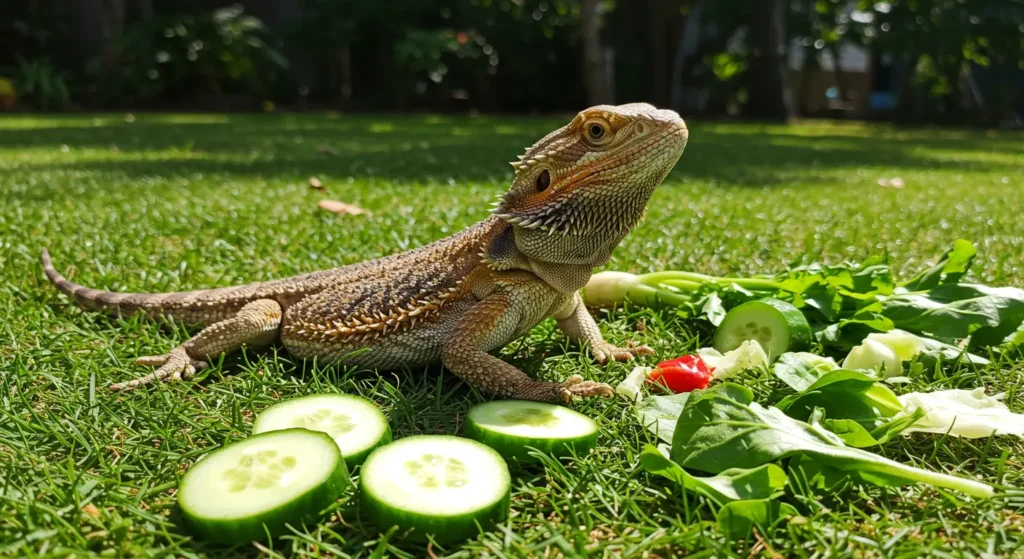
Vitamins and minerals: calcium, potassium, vitamin C, and vitamin K
In addition to hydration, cucumbers provide essential vitamins and minerals, supporting multiple aspects of health. Potassium aids muscle and nerve function, helping your dragon move actively and maintain balance. Magnesium contributes to strong bones and proper enzymatic reactions, while phosphorus is important for bone and tooth development. Vitamin C strengthens the immune system, promoting disease resistance and supporting healthy tissue growth. Vitamin K is crucial for bone formation and proper blood clotting. Although cucumbers are not the highest in calcium, when combined with calcium-rich greens like collard greens or kale, they contribute to a well-rounded diet. Including a variety of these vegetables ensures your dragon receives a broad spectrum of nutrients, reducing the risk of deficiencies and supporting long-term health.
Low-calorie treats and occasional snacks for young and adult dragons
Cucumbers are naturally low in calories, making them ideal for occasional treats without risking weight gain. For young dragons, cucumber pieces can be offered as a supplement to their protein-rich insect diet, encouraging healthy snacking habits. Adult dragons also benefit from occasional low-calorie vegetables to add variety without overfeeding. Incorporating cucumbers into a feeding rotation prevents dietary boredom and helps maintain consistent hydration levels. By serving cucumbers in small, bite-sized portions, owners can provide a rewarding snack while controlling nutrient intake. Rotating these snacks with other safe vegetables ensures a nutrient-dense diet, supports digestive health, and encourages natural foraging behavior, keeping your bearded dragon engaged, happy, and healthy.
Why Can’t Bearded Dragons Have Cucumbers Frequently?
Frequent cucumber consumption can lead to several health issues in bearded dragons. First, their high water content may cause overhydration, resulting in diarrhea and digestive discomfort. Second, cucumbers are low in calcium and contain more phosphorus, which can upset the delicate calcium-to-phosphorus ratio needed for strong bones and growth. Over time, repeated feeding can increase the risk of metabolic bone disease, especially in growing dragons. Additionally, cucumber peels and seeds, if not properly removed, may cause gut blockages or irritation. Finally, cucumbers alone do not provide sufficient nutrients, so relying on them frequently can create dietary deficiencies. Limiting cucumbers to a small portion a few times a week ensures hydration without compromising your dragon’s overall health or nutrition.
How to Prepare Cucumbers and Other Safe Vegetables for Bearded Dragons
Proper preparation of vegetables is essential to ensure your bearded dragon can safely enjoy them. This section covers washing, peeling, cutting, and serving cucumbers, as well as combining them with other safe vegetables.
Proper washing, peeling, and cleaning for safety
Before feeding cucumbers to your bearded dragon, it is important to thoroughly wash them to remove dirt, bacteria, and any pesticide residue. Even organic cucumbers should be rinsed under running water. After washing, peeling is recommended because the skin can be tough and difficult for your beardie to digest. While some bearded dragons may chew small pieces of peel, it is safer to remove it completely to prevent gut impaction. Clean utensils and cutting surfaces are also important to avoid cross-contamination from other foods. Following these safety steps ensures your pet receives a clean, safe vegetable that minimizes the risk of digestive problems or illness. Clean preparation also encourages consistent feeding habits, helping your dragon enjoy vegetables without complications.
Removing seeds and cutting into small, digestible pieces
Cucumber seeds can pose a choking hazard or digestive blockage if they are too large. To prevent this, scoop out all seeds before offering cucumber to your bearded dragon. After de-seeding, cut the cucumber into small, bite-sized pieces that your pet can easily chew and swallow. The pieces should generally be no larger than the distance between your dragon’s eyes. Properly sized pieces encourage natural feeding behavior, reduce the risk of choking, and ensure smooth digestion. Other vegetables should be similarly prepared: peel tough skins, remove seeds, and chop into small portions. This method makes feeding safer and more enjoyable, and it allows your beardie to get the nutrients and hydration from vegetables without straining their digestive system.
Recommended serving size and feeding frequency
Cucumbers should be considered an occasional treat rather than a staple vegetable. Offering cucumber once a week in small quantities is generally recommended for adult bearded dragons. Young dragons should have even smaller portions due to their higher need for protein from insects. Overfeeding cucumbers can cause digestive upset due to high water content and low calcium. When introducing any new vegetable, start with a few pieces and observe your dragon’s response. Rotating cucumbers with other safe vegetables ensures your pet receives a variety of nutrients while maintaining a balanced diet. Monitoring portion sizes and frequency helps prevent overhydration and digestive complications, contributing to long-term health and wellbeing.
Combining cucumbers with leafy greens and other vegetables
Combining cucumbers with leafy greens such as collard greens, kale, or spinach can enhance the nutritional value of your bearded dragon’s diet. Leafy greens provide calcium and other essential nutrients that cucumbers lack, ensuring a better calcium-to-phosphorus ratio. Mixing different textures and colors also encourages your dragon to eat a wider variety of vegetables, which is beneficial for overall health. You can serve cucumbers alongside zucchini, bell peppers, or butternut squash to create a visually appealing, nutrient-rich salad. Rotating vegetables and offering small portions together ensures your dragon receives hydration, vitamins, minerals, and fiber in every meal, supporting both digestive health and sustained energy levels.
Risks, Precautions, and Foods to Avoid When Feeding Cucumbers
Even safe vegetables like cucumbers have potential risks if not fed correctly. Understanding these risks and monitoring your bearded dragon is crucial for preventing health issues.
Overhydration, diarrhea, and digestive issues
Cucumbers are over 90% water, which makes them hydrating but potentially problematic if overfed. Consuming too many cucumbers can lead to diarrhea, soft stools, or digestive upset. Young or sensitive dragons are particularly vulnerable. It’s important to feed small portions and limit frequency to once a week. Signs of overhydration include watery stools, lethargy, or decreased appetite. To minimize risk, serve cucumbers alongside higher-fiber vegetables, which help maintain proper digestion. Monitoring your dragon after introducing cucumbers allows you to adjust portion sizes and feeding frequency, ensuring a safe and enjoyable snack without compromising their digestive health.
Calcium-to-phosphorus ratio concerns and metabolic bone disease
Bearded dragons require a diet with a favorable calcium-to-phosphorus ratio for strong bones and proper growth. Cucumbers are low in calcium and slightly higher in phosphorus, so excessive feeding can disrupt this balance. An imbalance increases the risk of metabolic bone disease (MBD), which can lead to weak bones, deformities, or fractures. To prevent this, cucumbers should only be offered occasionally and always in combination with calcium-rich vegetables like collard greens, mustard greens, or kale. Providing proper calcium supplementation and UVB lighting further supports bone health and reduces the risk of MBD, ensuring your beardie thrives throughout its life.
Potential gut blockages from peel or seeds
The tough peel or large seeds of cucumbers can cause digestive blockages if swallowed. Gut impaction is a serious issue that may require veterinary intervention. Removing the peel and seeds and cutting cucumber into small, bite-sized pieces is essential to avoid this problem. Always supervise your dragon’s first few feedings with new vegetables and check for any signs of distress. Serving cucumbers in a prepared, digestible form reduces the risk of gut blockages, making feeding safer and more effective. This careful preparation ensures your dragon benefits from hydration and nutrients without unnecessary health risks.
Monitoring your bearded dragon’s reaction to new foods
Every bearded dragon is unique, and their digestive systems can react differently to new foods. When introducing cucumbers or other vegetables, watch for changes in appetite, stool consistency, or behavior. Slow introduction and small portions help prevent digestive stress. Keep a log of new foods and how your dragon responds to identify potential sensitivities. If any adverse reactions occur, temporarily remove the new vegetable and consult a veterinarian if necessary. Careful observation and adjustment ensure that feeding cucumbers remains a safe, healthy, and enjoyable part of your dragon’s diet.
Top Alternatives and Complementary Vegetables for Bearded Dragons
While cucumbers are a safe occasional snack, other vegetables and fruits can provide more nutrients and variety. This section highlights the best alternatives and ways to create a balanced feeding plan.
Zucchini, bell peppers, collard greens, and squash
Vegetables like zucchini, bell peppers, collard greens, and butternut squash provide a broader nutrient profile than cucumbers. Collard greens are high in calcium, supporting strong bones, while bell peppers add vitamins A and C to boost immunity. Zucchini is low-calorie but hydrating, making it a good substitute for cucumbers. Butternut squash offers fiber and beta-carotene for digestive and skin health. Rotating these vegetables ensures a balanced intake of essential nutrients, while varying colors and textures stimulates natural foraging behaviors and keeps your dragon interested in meals.
Safe fruits for variety: strawberries, blueberries, and melon
Occasionally offering safe fruits like strawberries, blueberries, or melon adds flavor and nutritional diversity. Fruits provide vitamins, antioxidants, and hydration but should remain a small portion of the diet—usually under 10%—to avoid excess sugar. Melons are especially hydrating, while berries offer fiber and immune-boosting nutrients. Serving fruits in small, bite-sized pieces alongside vegetables introduces variety without disrupting a balanced diet. Alternating fruits and vegetables can keep mealtime engaging, encourage proper nutrient intake, and help prevent dietary monotony.
Creating a nutrient-rich, diverse feeding plan for beardies
A balanced feeding plan combines vegetables, occasional fruits, and insects to meet your bearded dragon’s nutritional needs. Plan weekly rotations of leafy greens, vegetables, and hydration-rich snacks like cucumbers or melon. Include calcium-rich greens with low-phosphorus vegetables to maintain a healthy ratio. Provide occasional fruits for variety and enrichment. Monitoring portion sizes, frequency, and reactions ensures long-term health and prevents dietary deficiencies. A thoughtfully structured diet keeps your beardie active, hydrated, and thriving, while minimizing health risks and encouraging natural feeding behaviors.
How Can Bearded Dragons Eat Cucumbers?
Bearded dragons should eat cucumbers in small, safe, and digestible portions. Start by washing the cucumber thoroughly to remove dirt or pesticides. Next, peel it to remove the tough outer skin, and scoop out the seeds to avoid choking or digestive issues. Cut the cucumber into bite-sized cubes or thin slices suitable for your dragon’s mouth size. You can also mix cucumbers with other leafy greens, like collard greens or kale, to boost calcium intake and improve nutritional balance. Serve cucumbers fresh and raw—cooked cucumbers are not recommended as heat can destroy essential vitamins. Observing how your dragon responds to cucumber pieces ensures they enjoy a safe, hydrating, and tasty snack that complements their regular diet.
Can Bearded Dragons Eat Cucumber Skin?
Cucumber skin is technically edible, but it is tougher and more fibrous, making it harder to digest for many bearded dragons. Some dragons may chew small pieces without problems, while others may experience gut impaction or discomfort. Leaving the skin on can slightly increase fiber content, but the potential risk outweighs the benefit for most beardies. If you choose to serve skin, ensure it is thinly peeled, well-washed, and chopped into tiny pieces. Removing the skin entirely is safer, especially for younger or smaller dragons. By carefully considering digestibility, you can provide cucumbers in the safest form while still offering hydration, flavor, and minor nutrients without compromising your dragon’s digestive health.
Conclusion
In summary, cucumbers can be a safe and refreshing treat for your bearded dragon when offered correctly. While the question, Can bearded dragons have cucumbers?, is common among pet owners, the answer is yes—but with moderation. Cucumbers provide hydration, low-calorie snacking options, and minor nutrients, making them a pleasant addition to a well-balanced diet.
However, it’s essential to follow safe feeding practices, including peeling, removing seeds, cutting into small pieces, and limiting servings to a few times per week. Overfeeding cucumbers or including the skin and seeds can lead to digestive issues or nutrient imbalances. Pairing cucumbers with leafy greens and other safe vegetables ensures your dragon receives essential vitamins and minerals while enjoying variety in its meals.
By following these guidelines, you can confidently include cucumbers as part of a healthy, diverse, and enjoyable diet for your bearded dragon, keeping them happy, hydrated, and thriving.

